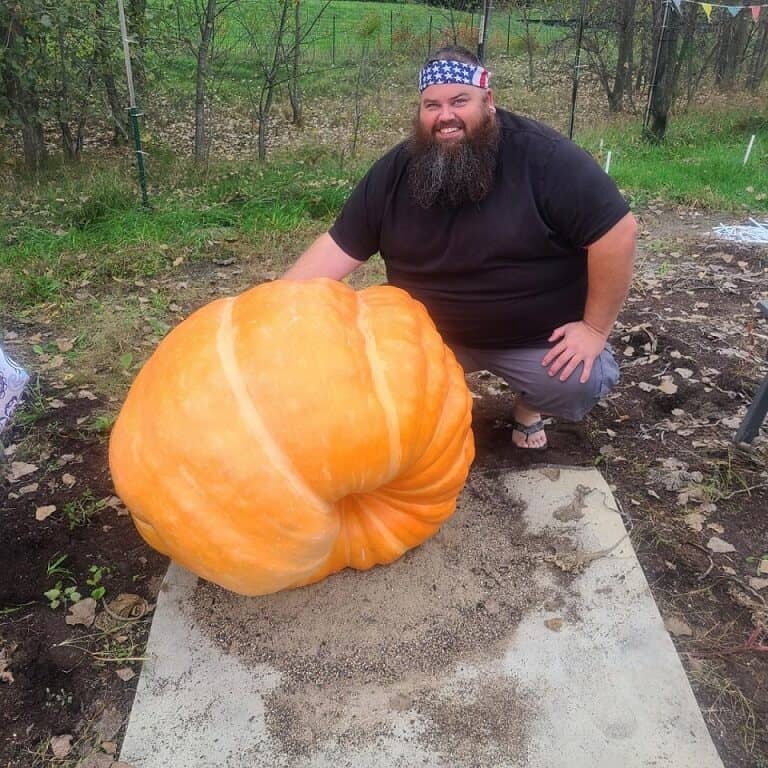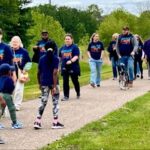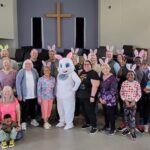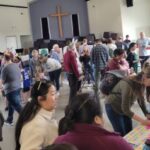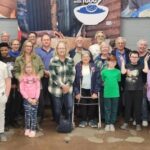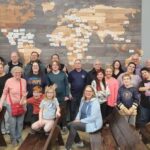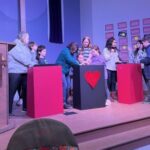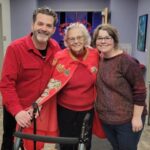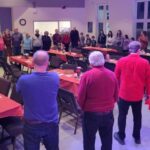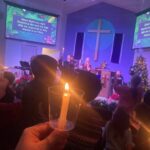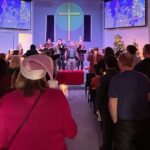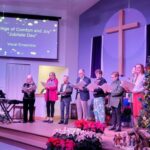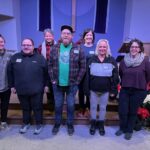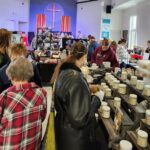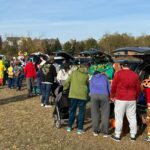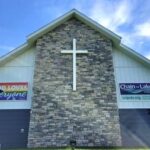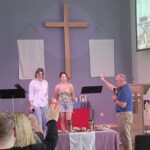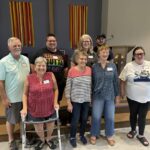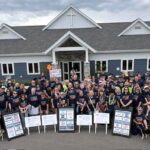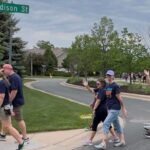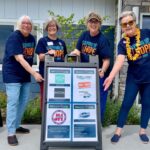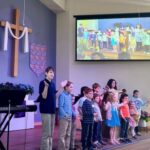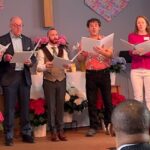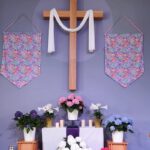Monday, January 19
Matthew 25:31-46
“When the Son of Man comes in his glory and all the angels with him, then he will sit on the throne of his glory. All the nations will be gathered before him, and he will separate people one from another as a shepherd separates the sheep from the goats, and he will put the sheep at his right hand and the goats at the left. Then the king will say to those at his right hand, ‘Come, you who are blessed by my Father, inherit the kingdom prepared for you from the foundation of the world, for I was hungry and you gave me food, I was thirsty and you gave me something to drink, I was a stranger and you welcomed me, I was naked and you gave me clothing, I was sick and you took care of me, I was in prison and you visited me.’ Then the righteous will answer him, ‘Lord, when was it that we saw you hungry and gave you food or thirsty and gave you something to drink? And when was it that we saw you a stranger and welcomed you or naked and gave you clothing? And when was it that we saw you sick or in prison and visited you?’ And the king will answer them, ‘Truly I tell you, just as you did it to one of the least of these brothers and sisters of mine, you did it to me.’ Then he will say to those at his left hand, ‘You who are accursed, depart from me into the eternal fire prepared for the devil and his angels, for I was hungry and you gave me no food, I was thirsty and you gave me nothing to drink, I was a stranger and you did not welcome me, naked and you did not give me clothing, sick and in prison and you did not visit me.’ Then they also will answer, ‘Lord, when was it that we saw you hungry or thirsty or a stranger or naked or sick or in prison and did not take care of you?’ Then he will answer them, ‘Truly I tell you, just as you did not do it to one of the least of these, you did not do it to me.’ And these will go away into eternal punishment but the righteous into eternal life.”
This week we will explore the idea of “the common good.” Pursuing and achieving the common good is one way that people can love God and love country together.
Jesus never used the term “common good,” but in his teachings he consistently communicated the common good. In fact, the common good is an important vision of Jesus for the world.
This vision is more than one where every person becomes his disciple. His vision is communicated in this story from Matthew where Jesus taught that whatever we do to the least of the community we do it directly to him. The poor are not objects of scorn; instead the poor are the actual representation of Jesus.
HOPE for the Community is one organization in the community who treats the poor and hungry as if they are Jesus. Every Thursday in Blaine they share high quality and nutritious food with hundreds of people.
Have you had an experience of serving at HOPE for the Community? How has that experience been an expression of this story? Or have you had an experience of serving the poor? Please share.
Tuesday, January 20
Micah 6:6-8
“With what shall I come before the Lord
and bow myself before God on high?
Shall I come before him with burnt offerings,
with calves a year old?
Will the Lord be pleased with thousands of rams,
with ten thousands of rivers of oil?
Shall I give my firstborn for my transgression,
the fruit of my body for the sin of my soul?”
He has told you, O mortal, what is good,
and what does the Lord require of you
but to do justice and to love kindness
and to walk humbly with your God?
Micah was an Old Testament prophet who spoke out during the last quarter of the eighth century (BC) when Ahaz and Hezekiah were kings of Israel. The name Micah means “who is like the Lord.”
The book of Micah is not long—only seven chapters. If you have twenty minutes, read the entire book.
In the sixth chapter Micah shares a compelling vision of the common good. He asked the question of whether God would be pleased with a sacrifice of thousands of rams, or ten thousands of rivers or special oil, or even the sacrifice of a child.
These would appear to be special sacrifices.
But no—God did not desire this quantity of sacrifice. Instead God desired that followers “do justice, love kindness and walk humbly with God.” The common good happens when people live out this verse.
HOPE 4 Youth is one organization who gives people the opportunity to live out this verse. HOPE 4 Youth is the only organization in the Twin Cities whose sole purpose is to help homeless youth. HOPE 4 Youth is an organization that is contributing to the common good.
Have you had an experience of serving at HOPE 4 Youth? How has your service reflected these verses in Micah? Please share.
Wednesday, January 21
Amos 5:18-24
Woe to you who desire the day of the Lord!
Why do you want the day of the Lord?
It is darkness, not light,
as if someone fled from a lion
and was met by a bear
or went into the house and rested a hand against the wall
and was bitten by a snake.
Is not the day of the Lord darkness, not light,
and gloom with no brightness in it?
I hate, I despise your festivals,
and I take no delight in your solemn assemblies.
Even though you offer me your burnt offerings and grain offerings,
I will not accept them,
and the offerings of well-being of your fatted animals
I will not look upon.
Take away from me the noise of your songs;
I will not listen to the melody of your harps.
But let justice roll down like water
and righteousness like an ever-flowing stream.
Like Micah, Amos lived in the eighth century (BC). Amos spoke out during the reigns of two kings, Uzziah of Judah and Jeroboam II of Israel. Not many details are known about the life of Amos. The book of Amos shares that the home of Amos was the village of Tekoa in the Judean hills south of Bethlehem.
These words from Amos are another startling example of how God views the common good.
Amos shared that God was tired of the people’s festivals and worship, and offerings. God did not want to hear the people’s worship. Instead, God wanted justice to roll down like waters, and righteousness like an ever-flowing stream. (Amos 5:24)
Justice and righteousness are important parts of the common good.
One organization who lives out justice and righteousness is Stepping Stone Emergency Housing. Stepping Stone runs the only homeless shelter in the suburban Twin Cities. The only one!
Most of the time when a resident leaves Stepping Stone that person goes to stable housing. That is making an impact and contributing to the common good!
Have you had an experience of serving at Stepping Stone? How has your service reflected these verses in Amos? Please share.
Thursday, January 22
Isaiah 61:1-11
The spirit of the Lord God is upon me
because the Lord has anointed me;
he has sent me to bring good news to the oppressed,
to bind up the brokenhearted,
to proclaim liberty to the captives
and release to the prisoners,
to proclaim the year of the Lord’s favor
and the day of vengeance of our God,
to comfort all who mourn,
to provide for those who mourn in Zion—
to give them a garland instead of ashes,
the oil of gladness instead of mourning,
the mantle of praise instead of a faint spirit.
They will be called oaks of righteousness,
the planting of the Lord, to display his glory.
They shall build up the ancient ruins;
they shall raise up the former devastations;
they shall repair the ruined cities,
the devastations of many generations.
Strangers shall stand and feed your flocks;
foreigners shall till your land and dress your vines,
but you shall be called priests of the Lord;
you shall be named ministers of our God;
you shall enjoy the wealth of the nations,
and in their riches you shall glory.
Because their shame was double
and dishonor was proclaimed as their lot,
therefore in their land they shall possess a double portion;
everlasting joy shall be theirs.
For I, the Lord, love justice,
I hate robbery and wrongdoing;
I will faithfully give them their recompense,
and I will make an everlasting covenant with them.
Their descendants shall be known among the nations
and their offspring among the peoples;
all who see them shall acknowledge
that they are a people whom the Lord has blessed.
I will greatly rejoice in the Lord;
my whole being shall exult in my God,
for he has clothed me with the garments of salvation;
he has covered me with the robe of righteousness,
as a bridegroom decks himself with a garland
and as a bride adorns herself with her jewels.
For as the earth brings forth its shoots
and as a garden causes what is sown in it to spring up,
so the Lord God will cause righteousness and praise
to spring up before all the nations.
This chapter shares a picture of the common good. Read this chapter through more than once. It’s worth spending time thinking deeply about the message of this chapter.
When Jesus began his ministry in a synagogue he read these words from Isaiah. After Jesus read the words, he said that they had been fulfilled. Jesus and the values he represented were the fulfillment of Isaiah 61. (Luke 4:16-21).
Does a phrase in Isaiah 61 especially speak to you? Please share.
One organization who lives out the message of Isaiah 61 is Threshold to New Life, led by Richard Bahr. They help bridge the gaps in the life of low-income people. Their web site is threshold2newlife.org.
They run a soup kitchen at a Salvation Army near Target Field. At that soup kitchen homeless people who actually live outdoors are fed. This soup kitchen is helping the common good become a reality.
Have you an experience of serving at this soup kitchen or perhaps even another soup kitchen? How has the experience been an expression of Isaiah 61? Please share.
Friday, January 23
Deuteronomy 30:11-20
“Surely, this commandment that I am commanding you today is not too hard for you, nor is it too far away. It is not in heaven, that you should say, ‘Who will go up to heaven for us and get it for us so that we may hear it and observe it?’ Neither is it beyond the sea, that you should say, ‘Who will cross to the other side of the sea for us and get it for us so that we may hear it and observe it?’ No, the word is very near to you; it is in your mouth and in your heart for you to observe.
“See, I have set before you today life and prosperity, death and adversity. If you obey the commandments of the Lord your God that I am commanding you today, by loving the Lord your God, walking in his ways, and observing his commandments, decrees, and ordinances, then you shall live and become numerous, and the Lord your God will bless you in the land that you are entering to possess. But if your heart turns away and you do not hear but are led astray to bow down to other gods and serve them, I declare to you today that you shall certainly perish; you shall not live long in the land that you are crossing the Jordan to enter and possess. I call heaven and earth to witness against you today that I have set before you life and death, blessings and curses. Choose life so that you and your descendants may live, loving the Lord your God, obeying him, and holding fast to him, for that means life to you and length of days, so that you may live in the land that the Lord swore to give to your ancestors, to Abraham, to Isaac, and to Jacob.”
These words were given by Moses to the Israelites shortly before Moses died. Read all ten verses—taken together they share a powerful vision of the common good. They even give practical ways to live out the common good. In verse 20 we read that people can choose life and live out the common good by loving God, obeying God, and holding fast to God.
One organization that lives out the value of life is River Trail Learning Center. It is a full day Special Education Setting Level IV Program for students K-12.
River Trail Learning Center is a partner with Chain of Lakes Church. The congregation helped sponsor a barbeque for their staff this past year. In the past the people of Chain of Lakes have given bags of toiletry items to students at the school.
Did you have an opportunity to share these items with students at River Trail Learning Center? How was your experience of purchasing and sharing these items one of choosing life? Please share.
Saturday, January 24
Jeremiah 22:1-5
Thus says the Lord: Go down to the house of the king of Judah, and speak there this word, and say: Hear the word of the Lord, O king of Judah sitting on the throne of David—you, and your servants, and your people who enter these gates. Thus says the Lord: Act with justice and righteousness and deliver from the hand of the oppressor anyone who has been robbed. And do no wrong or violence to the alien, the orphan, and the widow, or shed innocent blood in this place. For if you will indeed obey this word, then through the gates of this house shall enter kings who sit on the throne of David, riding in chariots and on horses—they, their servants, and their people. But if you will not heed these words, I swear by myself, says the Lord, that this house shall become a desolation.
The prophet Jeremiah lived in the late 7th century and early 6th century (BC). He spoke out for justice and righteousness. He spoke out in an especially dangerous time in Israel and Judah. Eventually Jeremiah was killed for what he said.
These verses share what is at stake in being successful in living out the common good. God was saying that if the leaders of Judah lived out justice and righteousness the nation of Judah would thrive, but if the nation did not live out justice and righteousness the nation would be destroyed.
Take a moment to ponder that message!
This week we’ve read about five organizations who live out justice and righteousness and who have a partnership with Chain of Lakes Church. What is another organization you have particularly admired who lives out justice and righteousness? Please share the name and a bit about your own connection to the organization.


